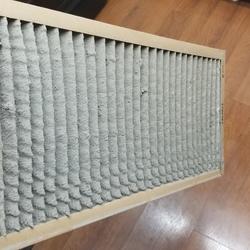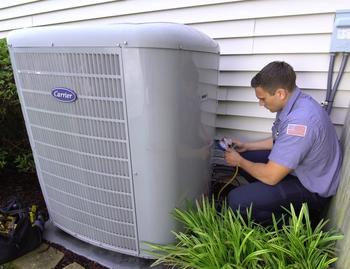5 Types of Furnace Problems Caused By Dirty Air Filters
While it may be a nuisance to change regularly, a clogged air filter can cause serious problems for your furnace.
In this article, we’ll go over 5 types of furnace problems caused by dirty air filters:
Need your air filter changed?
Our NATE-certified technicians will check and clean your furnace to ensure everything is in working order—including cleaning or replacing the air filter. Contact us today to schedule a $59 furnace tune-up or learn more about what’s included in our furnace tune-ups.
Problem #1: High heating bills
Your furnace uses a blower fan to pull air from your home into the system, heat it, and then expel the heated air back into your home.
When your air filter is clogged, the fan has to work harder to pull air into the system, increasing your heating bills.
If your unit is located in the ceiling, the dirty air filter can cause a banging sound from the force of the filter being pulled up when the fan kicks on and dropping back down once the fan is running. Learn more about the different sounds furnaces can make in our blog, “Why Is My Furnace Making Noises?”
In addition to the inconvenience of high bills, a clogged filter can cause your furnace to not work properly.
Problem #2: Overheating furnace
Proper airflow helps your furnace maintain a consistent internal temperature. A dirty air filter restricts airflow, which can cause your furnace to overheat.
Today, most furnaces have a safety feature that turns off the unit when the internal temperature gets too high. So if you notice your furnace turning off shortly after it turns on, or if your furnace is blowing cold air, a clogged air filter could be the issue.
Plus, all of that built-up heat can actually damage parts of your furnace.
Problem #3: Damaged parts
A clogged air filter can damage the:
- Heat exchanger: The heat building up inside the furnace can put stress on the heat exchanger—the metal chamber that allows the furnace to safely heat your home’s air—causing it to crack. A cracked heat exchanger can cause the gases being burned during combustion (carbon monoxide, sulfur dioxide, and nitrous oxide) to escape into your home’s air.
- Blower motor: When the air filter is clogged, the blower fan overworks itself trying to pull air into the system. This can cause the motor to work less effectively or stop working entirely.
If a clogged filter doesn’t kill the blower motor, it will put more strain on it, resulting in inadequate heating throughout your home.
Problem #4: Cold spots
Clogged filters can cause inconsistent heating, resulting in hot or cold spots in your home.
Since the blower motor has to work so hard with a dirty air filter, it can’t blow air into your home as forcefully as it usually would. When flowing at a slower pace, the heated air can’t reach every corner of your home, making some spots (or even entire rooms) noticeably colder than others.
In addition to colder air, the quality of the air can also decrease with a dirty filter.
Problem #5: Poor indoor air quality
Your air filter has one job: Catch the impurities in your home’s air to prevent them from being circulated through your heating system.
When the air filter is full of dust, dirt, and debris, those impurities have nowhere else to go but back into your home’s air—reducing the quality. This could worsen health issues for family members with allergies, asthma, or other respiratory conditions.
To keep your air quality at its best, we recommend:
- Changing your air filter regularly. For most air filters, that means monthly. HEPA (high-efficiency particulate air) filters should be changed every 3–6 months.
- Upgrade to a polarized air filter. Polarized air filters have charged fibers that act like a magnet to attract particles small enough to pass through regular air filters. These filters have a 97% efficiency rating and are designed to work with your existing furnace.
- Install an air cleaner or purifier. Installed inside your HVAC system, HEPA air cleaners filter out germs, bacteria, viruses, and allergens from your home. And UV air purifiers use natural UV-C light to kill viruses, bacteria, and other pathogens that pass through the system.
The best way to keep your air filter clean is with regular furnace maintenance.
Importance of furnace maintenance
Annual furnace tune-ups will help boost the efficiency and lifespan of your system.
Regular maintenance is like getting an annual check-up at the doctor: they help make sure everything’s in working order and catch issues before they turn into serious problems.
Need furnace maintenance? Call Michael & Son for a furnace tune-up.
At Michael & Son, we offer honest, upfront pricing for all furnace services. Our heating techs provide the best customer service in the area and answer any questions you have about your furnace or improving your indoor air quality. We’ll help you get your home back to comfortable.
This blog was written on Sep 27, 2021. Any pricing information is subject to change.



